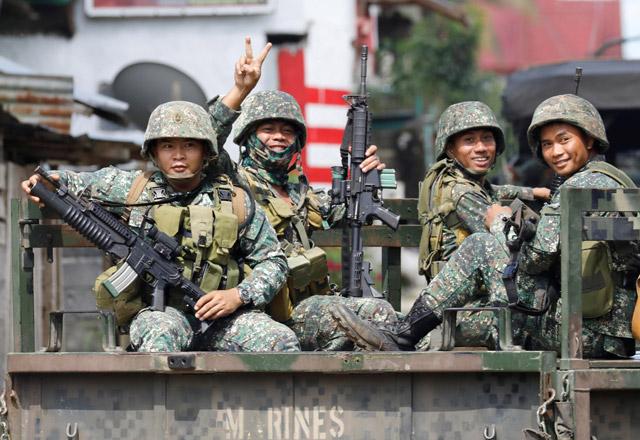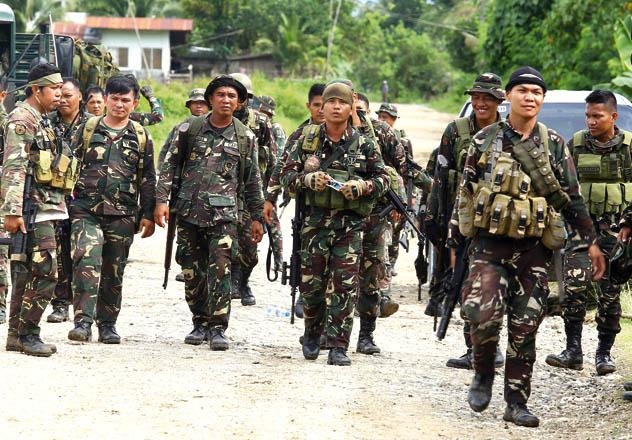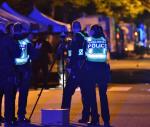You are here
Philippines warns extremist militants to surrender or die
By AFP - May 30,2017 - Last updated at May 30,2017

Philippine marines smile at the media near the stronghold of Maute group in Marawi City in southern Philippines, on Tuesday (Reuters photo)
MARAWI, Philippines — Philippine authorities on Tuesday warned extremist militants occupying parts of a southern city to surrender or die, as attack helicopters pounded the gunmen's strongholds where up to 2,000 residents were feared trapped.
More than 100 people have been confirmed killed in the conflict, which began last week when gunmen waving black flags of the Daesh terror group rampaged through the mostly Muslim-populated city of Marawi.
President Rodrigo Duterte declared martial law across the entire southern region of Mindanao, home to roughly 20 million people, in response to the crisis as he warned that local militant groups were uniting behind Daesh and becoming a major security threat.
But the militants, initially estimated by the nation's defence chief to number just 100, withstood eight days of intense air assaults and street-to-street combat, prompting the government's threats on Tuesday.
"We call on the remaining terrorists to surrender while there is an opportunity," military spokesman Brigadier-General Restituto Padilla said.
"For the terrorists, not surrendering will mean their sure death."
Padilla also told AFP the surrender call was aimed at limiting the loss of more lives and property.
Up to 2,000 residents were trapped in areas held by the militants, according to the local government, and the International Committee of the Red Cross voiced alarm they would be caught in the bombing raids or crossfire.
"The risks and the vulnerabilities of the people inside Marawi are rising every day," ICRC spokeswoman Lany Dela Cruz told AFP.
The militants also took a priest and up to 14 other people hostage at the start of the crisis.
A video of the priest appeared on social media on Tuesday in which he repeated the militants' demands to withdraw, although it was unclear when the footage was filmed and its veracity could not be immediately verified.
Clashes on Tuesday appeared to be as intense as previous days, according to an AFP reporter who followed security forces who had to run from militants' sniper fire coming from nearby buildings.
Military helicopters fired rockets repeatedly on that part of the city on Tuesday morning, and black smoke rose from the buildings that were apparently hit.
The militants had killed at least 19 civilians, while 20 security forces and 65 gunmen had died, according to the military.
Planned major assault
The violence began when dozens of gunmen went on a rampage in response to an attempt by security forces to arrest Isnilon Hapilon, a veteran Filipino militant regarded as the local leader of Daesh.
Hapilon, a senior member of the Abu Sayyaf kidnap-for-ransom gang, is on the US government's list of most-wanted terrorists.
He was being protected in Marawi by the local Maute group, which has pledged allegiance to IS.
The gunmen were being backed by foreign fighters, including Malaysians, Indonesians and Singaporeans, authorities said.
Hapilon, the Maute and other militants had been planning a major attack on Marawi, one of the few Islamic cities in the mainly Catholic Philippines with a population of 200,000 people, armed forces chief General Eduardo Ano said.
He said they were planning to launch the assault to coincide with the Muslim holy month of Ramadan, which began on the weekend, but the raid on Hapilon triggered them to attack earlier, according to Ano.
A Muslim separatist rebellion in the southern Philippines has claimed more than 120,000 lives since the 1970s.
The main Muslim rebel groups have signed accords with the government aimed at forging a final peace, giving up their separatist ambitions in return for autonomy.
The Maute, the Abu Sayyaf and other hardline groups are not interested in negotiating and have in recent years looked to Daesh to help them.
The Marawi violence was intended to highlight their credentials to Daesh, security analysts have said.
Duterte said Saturday he was prepared to enforce martial law for as long as was necessary to end the terrorist threat.
Related Articles
MARAWI, Philippines — The Philippines military said on Monday it was close to retaking a southern city held for a seventh day by extremist m
MARAWI, Philippines — Extremist gunmen led by one of the world’s most wanted terrorists still hold about 1,500 buildings in a southern Phili
MARAWI, Philippines — Extremists occupied a primary school and took hostages in a southern Philippine village on Wednesday, a few hours driv



















